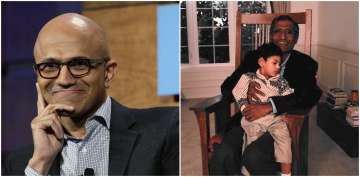Father's Day 2020: Microsoft CEO Satya Nadella has shared a heartfelt note remembering his father - BN Yugandhar - this Father's Day. Nadella took to his official LinkedIn profile and shared a heartfelt note and photos of his childhood in India. Hyderabad-born Nadella later travelled to the US to study for an MS in computer science at the University of Wisconsin–Milwaukee. "My father's work was more than just a job for him. He was ten years old when India became independent, and approximately a dozen or so years later my father joined the Indian Administrative Service (IAS) as a civil servant. To him, this was not a professional career choice, but a calling," an emotional Nadella's post says.
Nadella's father BN Yugandhar, a 1962 batch IAS officer died in Hyderabad following a brief illness last year at age 82. Yugandhar served in the Prime Minister's Office under PV Narasimha Rao, and also as director of the Mussoorie-based Lal Bahadur Shastri National Academy of Administration.
Satya Nadella's heartfelt note for father:
"Remembering my father"
"One of my earliest memories of my father was getting up in the middle of the night and finding him sitting up in his bed reading a thick hardback book. Everything was quiet and dark, except for the bedside light that reflected off his white kurta and the mosquito net. There were many official reports stacked by the bedside. He had returned home late, after everyone else had gone to bed, from a grueling trip to a remote area in rural India during a difficult period of turmoil in the district we lived in. He had taken a quick bath, changed, and was back to work. When I saw him, he was finally taking a break and reading one of his favorite Russian authors before getting a few hours of sleep. That moment and that memory capture my father – his passions, his values, and his life’s work."
"My father’s work was more than just a job for him. He was ten years old when India became independent, and approximately a dozen or so years later my father joined the Indian Administrative Service (IAS) as a civil servant. To him, this was not a professional career choice, but a calling. There was the fervor of nation-building in the air, and he inhaled it all with an unwavering deep sense of passion and commitment throughout his life. To him, land reforms, bonded labor abolition, watershed development, rural employment programs, self-help groups, disabled communities, and much more were not topics or portfolios, but his life’s purpose. He immersed himself in field programs, policy formulation, and legislative work, tirelessly pushing for progress in each of these areas through the decades. What gave him deep satisfaction was not abstract, but the people he was working for and the impact that his work was having in their lives. The way he combined his work with his life’s passions, the deep meaning he derived from it, has been instrumental in shaping my own views of work and life."
To him, land reforms, bonded labor abolition, watershed development, rural employment programs, self-help groups, disabled communities, and much more were not topics or portfolios, but his life’s purpose.
"He was an institution builder at his core. He would always say that one’s true impact could only be evaluated after that person had moved on from their current assignment. It’s the people you mentor and empower and the culture you build that will have a lasting impact. He was weary of people who walked into new assignments ready to dismantle things before understanding what needed to change or had a real vision for what new capability could be built that would give the institution strength to further its impact. He spent many years at India’s National Academy of Administration, first as a student, then as junior faculty, and later as its director. He took great pride in all the people he trained at the institute. He felt his work at the institute could have an amplifying impact by taking the most amazing talent that joined the IAS, shaping their mindset, and turning them into committed missionaries working and fighting for India’s underprivileged people and regions. He knew that those selected into the IAS possessed the capability to do the work, but it was the institution’s purpose to translate that intellectual capability into everyday actions of a committed civil servant."
Read Full Note Here
Latest Business News
